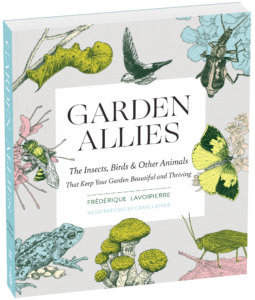The Insects, Birds & Other Animals That Keep Your Garden Beautiful and Thriving
By Frederique Lavoipierre
Published by TimberPress
Reviewed by Molly Kerker
In Garden Allies: The Insects, Birds & Other Animals That Keep Your Garden Beautiful and Thriving Frederique Lavoipierre encourages a perspective shift towards the critters in our gardens. Instead of thinking of garden inhabitants as good or bad, she encourages us to think of them in their ecological roles, with a food-web perspective. What results is a book jam-packed with identification clues, gardening guidance, and stories that had me penciling exclamation points in the margins.
In each chapter, garden allies are grouped by their habitat or ecological niche. For example, the first chapter studies life underground (including earthworms, slime molds, protists, mycorrhizae, and springtails). In contrast, the final chapter focuses on creatures of the sky, such as birds and bats. Other chapters include flower visitors, familiar garden insects, and even an entire chapter devoted to beetles.
Lavoipierre draws in the reader with wondrous visions—earthworms that smell like lilies, spiderlings that float on silky strands in the breeze, and mushrooms that burst out of the heads of caterpillars. She inventories the many critters within each ally group and how they relate to the larger garden ecosystem. At the end of each chapter, she provides practical tips on supporting these allies in our gardens. (Avoiding pesticides is a common theme, but she also suggests plant choices, habitat creation, and maintenance practices particular to each ally group.) Select allies are illustrated throughout in black and white.
Garden Allies is appropriate for many audiences, from the backyard gardener to the entomologist. The level of detail in this book sometimes made my head swim—introducing many new-to-me terms such as “koinobionts” (the phenomenon whereby a parasitoid develops in a host without killing it) and including lists of taxa of each group. For a layperson such as myself, the overall feeling was one of a sense of reverence for our complex world; I imagine an entomologist, on the other hand, would appreciate the scientific precision. With practical applications sprinkled throughout, everyone will find this book a useful guide to turn knowledge into action.
Perhaps other readers will be initially surprised, as I was, by some of the truths that Lavoipierre unfurls in this book—for example, that we “really need aphids,” that most ants are beneficial, or that slugs and snails are an important part of the food web. Reading Garden Allies brought me back to a place of childlike wonder, as I was invited to see garden critters with fresh eyes. Garden Allies is a wonderful book for anyone curious about the garden food web, fascinated by insects, open to new perspectives—and ready to act for a more resilient ecosystem.
About the Reviewer
Molly Kerker is Director of Continuing Education at Central Park Conservancy’s Institute for Urban Parks, where she oversees learning opportunities for park professionals. Molly received her BA in English at SUNY Geneseo, MA in Public Humanities from Brown University, as well as Urban Naturalist and Horticulture certificates from the New York Botanical Garden and Brooklyn Botanic Garden, respectively. Prior to her current role, she developed and managed educational programming at museums and academic spaces, including Brooklyn Botanic Garden, the Haffenreffer Museum, and Cornell University. Molly is a birder, musician, and caretaker of a growing collection of native plants outside her apartment in Brooklyn, NY.
***
Each author appearing herein retains original copyright. Right to reproduce or disseminate all material herein, including to Columbia University Library’s CAUSEWAY Project, is otherwise reserved by ELA. Please contact ELA for permission to reprint.
Mention of products is not intended to constitute endorsement. Opinions expressed in this newsletter article do not necessarily represent those of ELA’s directors, staff, or members.


